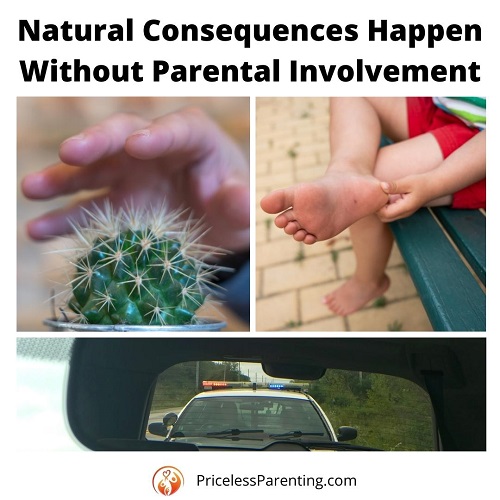Harnessing the Power of Natural Consequences to Teach
by Kathy Slattengren, M. Ed., Priceless Parenting (sign up for monthly parenting newsletter and receive 20+ printable charts for kids and parents)

Your children are continually making decisions and learning from the results. Natural consequences are simply the good and bad things that happened based on their choices.
What’s wonderful about natural consequences is that you don’t need to do anything to make them happen! However, there are ways you can help your kids more deeply consider the consequences of their behavior.
Highlighting the Effects on Them
How can you encourage your kids think carefully about their decisions? One powerful way is by highlighting the effects of their choices on themselves.
Here are some examples of pointing out natural consequences:
- “It will be scary for you if you get separated from me at the store. You probably want to stick close to me.”
- “The more you practice shooting hoops, the better you’ll get.”
- “If you run on by the wet pool deck, you might slip and hurt yourself.”
- “Last time you had a big math test you stayed after school for a couple study sessions. You did well on the test.”
- “When you wash your hands before you eat, you help prevent yourself from getting sick.”
- “If you hang out with kids who are doing drugs, you’re more likely to be tempted to take drugs too. Taking drugs would hurt your chances of making the All Star team.”
When highlighting the effects on them, you are not telling them what to do. Ultimately your children control their own behavior. All you are doing is pointing out the potential results from the choices they make.
Appreciating the Impact on Others
Whenever your children’s behavior impacts others, there will be natural consequences from these people.
You might point out some of these natural consequences by saying things like:
- “Grandma is so happy when she gets a call from you. Hearing from you means a lot to her.”
- “You took the doll from her and now she’s crying.”
- “Your little brother loves when you read books to him.”
- “I was very worried when you were late and hadn’t called.”
- “When you cover your mouth when you sneeze, other people appreciate it.”
- “She looked pleased when you thanked her for the gift and told her how much you liked it.”
Whether the impact is positive or negative, describing it helps your kids consider how their behavior affects others. Being aware of this is key to developing healthy relationships.
Anticipating Positive and Negative Results
Positive and negative results are also natural consequences of your children’s behavior. By the time your kids are teens, the majority of these will be coming from people other than you.
Here are some ways you might help your kids think ahead about possible positive and negative results:
- “Your teacher said you can turn your work in late but she will only give you half the credit.”
- “If you save your money for four weeks, you will have enough to buy that game.”
- “Your coach said he can only play you in the game if your grades are at least a C in all your classes.”
- “If you let go of your balloon, it will fly away.”
- “Your bike will get rusty and not work well if you leave it out in the rain.”
- “If you are ready for bed by 8:00, we’ll have time to read two stories.”
Sometimes it is difficult for your children to anticipate the positive or negative results from their behavior. When you help them think through these possibilities, they are in a position to make better decisions.
When to Protect, When to Step Back
Are there times when it’s okay to prevent your kids from suffering the natural consequences of their decisions? Sure! That’s what’s tricky about parenting … it’s a balancing act with few clear answers.
Certainly when your kids are young there are many times you have to step in to protect them from harmful natural consequences. But how about with older kids? For example, what if your son forgets to bring in his field trip permission slip and is calling you to bring it to school so he can go on the trip today. Should you bring it to him or let him suffer the natural consequences of missing the field trip?
You might bring it to him because you feel he typically is responsible but forgot this once. Or you might see this as a repeated behavior and decide not to bring it in so that he learns from the consequences.
How do you know if you should let your kids experience natural consequences or help them avoid those consequences? If you quiet your mind, you'll be able to hear the wisdom in your own heart.